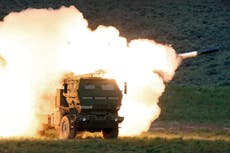World entering ‘dangerous new age’ amid rapid spread of lethal weapons, warns UK national security adviser
Sophisticated weapons being acquired by armed groups as well as states, Sir Stephen Lovegrove says


The rapid spread of lethal weapons in a fragmented and bitterly divided world is ushering in an age of peril and uncertainty, Britain’s national security adviser has warned.
Sir Stephen Lovegrove said sophisticated arms are being acquired by armed groups as well as states and raising the likelihood of conflicts with great loss of lives.
At the same time, China’s nuclear modernisation combined with its combative stance is a “daunting prospect” for its neighbours as well as the West, he added.
The devastating war following Vladimir Putin’s invasion of Ukraine is “a manifestation of a much broader contest unfolding over the successor of the post-Cold War international order”, said Sir Stephen.
“We are entering a dangerous new age of proliferation, in which technological change is increasing the damage potential of many weapons, and those weapons are also more widely available.”
Speaking at the Centre for Strategic and International Studies (CSIS) in Washington, Sir Stephen said the US, Britain and their allies have “a moral and pragmatic duty to reset strategic stability for the new era”.
The end of the decades of confrontation between the West and the Soviet Union now presents its own problems, while the entry of other actors in the global military scene, such as North Korea and Iran, has added another risky dimension.
“The Cold War’s two monolithic blocks of the USSR and Nato – though not without alarming bumps – were able to reach a shared understanding of doctrine that is today absent,” said Sir Stephen.
“Doctrine is opaque in Moscow and Beijing, let alone Pyongyang or Tehran. So the question is how we reset strategic stability for the new era – finding a balance among unprecedented complexity so there can be no collapse into uncontrolled conflict.”
Both Moscow and Beijing have shown little regard for the rules-based international order, the national security adviser said.
The volatile environment is “exacerbated by Russia’s repeated violations of its treaty commitments, and the pace and scale with which China is expanding its nuclear and conventional arsenals and the disdain it has shown for engaging with any arms control agreements”.
Pointing to the prevalence of advanced weaponry, Sir Stephen said: “The International Institute for Strategic Studies has assessed that in 2001 only three states possessed dedicated land-attack cruise missiles.
“Today at least 23 countries and one non-state actor have access to these weapons. And that last point is important. Many non-state actors could, absent proper control, develop further capabilities.”
But, despite the obstacles being faced, Sir Stephen said it was imperative “to renew both deterrence and arms control, taking a more expansive and integrated approach to both ... future integrated arms control will need to extend across several interlinked and overlapping categories of proliferation”.
The road forward, he said, needed to include a dialogue beyond the Western alliance. There should be “a pragmatic focus on establishing and regulating behaviours, setting red lines for the grey zone as it emerges as the new arena for strategic competition; a start with dialogue, to create and preserve space and channels for dialogue to build trust and counter disinformation, and take early action to renew confidence-building measures and to contribute to, reduce, or even eliminate the causes of mistrust, fear, tensions and hostilities”.
Join our commenting forum
Join thought-provoking conversations, follow other Independent readers and see their replies
Comments


Bookmark popover
Removed from bookmarks